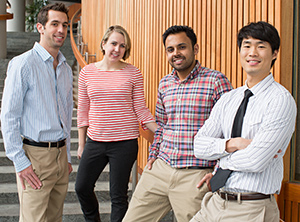

Homeless Outreach
Helping Homeless in the Bronx
“I think the general public often loses sight of the fact that the homeless are people, too,” said Julian Rothschild, a second-year Einstein medical student who is co-president of the Homeless Outreach Project at Einstein (HOPE). “When you’re with them and talk to them, you see them for who they are and it really grounds you.”

HOPE's current leadership includes (from left): Julian Rothschild, Rebecca Wilson, Junaid Chaudhry and Don YoonHOPE grew out of Einstein Cares for the Community (ECC), a program that was supported by a grant received by family and social medicine, through which medical students Iman Hassan and Mariya Masyukova—currently in their fourth year—established several initiatives designed to serve the homeless community in the Bronx.
Members of the student group, led by Ms. Hassan and Ms. Masyukova, offered one-on-one counseling at a women's shelter where Dr. Andrea Littleton and residents from Montefiore volunteered. The students also shadowed the residents, and developed a website that provided useful information and resources for shelter clients.
When the doctors shifted their work to the Living Room—the borough's only 24-hour drop-in center for homeless adults, affiliated with the organization BronxWorks—the ECC-supported group followed. “The staff and clients there expressed the need for educational workshops,” explained Ms. Masyukova. “So, Iman and I designed and facilitated the initial curriculum about health.”
Establishing HOPE
When the grant ended in 2012, Samim Atmar and Danielle Chung, Einstein medical students now in their third year, established the project as a student club under its new name. They expanded HOPE’s offerings to provide services that would be helpful to homeless individuals in the Bronx.
In the wake of this transition, a handful of regular volunteers organized workshops at the Living Room. The club also became part of the Einstein Community Action Network, which is supported by Einstein's Community Based Service Learning Program.
HOPE now has more than 40 active members who volunteer at the Living Room, or do medical outreach on the streets of the Bronx, two to three times per semester. Members are required to volunteer in one of the project's three divisions—adult continuing education (ACE), health education or harm reduction.
Offering Practical Educational Opportunities
ACE evolved from a General Education Development (GED) program that Einstein volunteers led at the Living Room. “We noticed that many of the attendees weren’t benefitting from GED prep or already had their GED,” said Don Yoon, a second-year medical student who developed a more practical program with classmate Liz Liu. Mr. Yoon’s English class offers clients a chance to open up about their lives through writing and discussing stories, while Ms. Liu’s math class focuses on everyday mathematics.
Since the switch, ACE classes have grown from just three or so occasional attendees to more than 10 regulars at the two-hour Saturday class.
Improving Health Literacy
Through its health education initiatives, HOPE volunteers provide weekly informational workshops at the shelter, offering useful tips on topics including nutrition, protecting against colds or the flu, and preventing HIV and hepatitis C.
“The students focus on areas that are of grave concern to our clients,” said Alfred Charles, the Living Room’s activity specialist. “It’s been extremely effective.”
Taking It to the Streets
HOPE members also offer medical assistance on the streets of the Bronx while shadowing Dr. Littleton, who serves as the group’s faculty advisor. Dr. Littleton provides basic medical treatment out of a backpack filled with supplies useful in meeting a variety of needs, from bandages to blood pressure medicine, and instruments for administering care.
“A lot of what Dr. Littleton does involves engaging with the person and encouraging them to go into temporary housing,” noted Mr. Rothschild. “That’s something that we students can assist with.”
“I really value their energy and enthusiasm,” said Dr. Littleton. “They’ve added tremendously to the work I do with the homeless.”
Addressing Risky Behaviors
The newest HOPE activity is its harm reduction program, started this past year by second-year student Rebecca Wilson. “I was inspired, in part, when I attended some Narcotics Anonymous meetings, which is something we encourage our members to do,” said Ms. Wilson. “The idea behind the initiative is to help those individuals who are least likely to seek assistance.”
Students volunteering in this HOPE division work with New York Harm Reduction, an organization that helps to connect drug users and sex workers to resources such as needle exchanges and basic health services.
“Among the things we’re taught is how to instruct individuals concerning the safe injection of Narcan, a drug that helps reverse the effects of an opiate overdose,” explained Ms. Wilson. “Our main goal, though, is to be a friendly face in the medical community and be out their consistently.”
Providing for Basic Needs
In addition to its three key missions, each year HOPE members hold a fundraiser through which members of the Einstein community donate money, new socks and gently used shoes. The funds support the purchase of additional socks and a holiday party at the Living Room. This past December, the students raised enough money to provide 120 shelter clients with socks and other articles of winter clothing, and a $200 donation to BronxWorks.
The impact of their experiences, particularly getting out of the classroom to help some of New York’s neediest citizens, is powerful to many of HOPE’s members. “It gives us an opportunity to step out of our comfort zone and away from the medical school bubble to truly engage with members of the Bronx community,” said Mr. Yoon.
Posted on: Wednesday, March 26, 2014

Tablet Blog